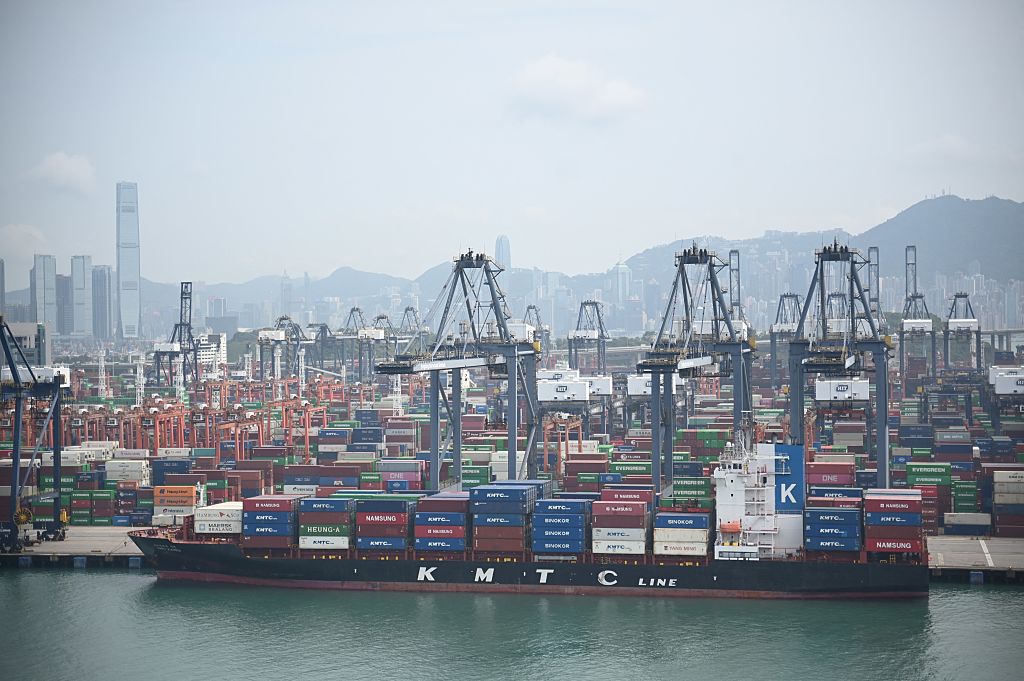Congress should turn President Donald Trump’s 2020 executive order suspending Hong Kong’s special trade status into law, an advisory panel said, citing China’s “complete political control” over the city and its regulatory environment.
The recommendation appears in the U.S.-China Economic and Security Review Commission’s annual report, released on Nov. 18. The commission—an independent body created by Congress in 2000—advises lawmakers on the national security implications of economic and trade relations between the world’s two largest economies.
The section devoted to Hong Kong spans 12 pages of the commission’s more than 700-page report. It describes how, in the five years since the Beijing-imposed National Security Law took effect, Hong Kong has increasingly come to resemble any other mainland Chinese city in both political and economic systems.
The National Security Law was introduced in 2020 in the name of restoring public order after massive protests against a proposed bill that would have allowed extradition to China. In practice, the law has been used to arrest, prosecute, and silence dissidents—both in Hong Kong and abroad—for a wide range of previously protected activities now classified as “subversion.” In 2024, Hong Kong’s legislature passed the Article 23 Ordinance, which further expands Beijing’s oversight by compelling local officials to cooperate with mainland agencies and criminalizing additional forms of political speech.
With these laws in place, Hong Kong is now subject to the same level of repression against free speech and assembly as the communist regime-ruled mainland, the commission said.
“China has completely reneged on its promise to preserve a significant degree of autonomy for Hong Kong under ‘One Country, Two Systems,’ leaving the remnants of rule of law and judicial independence as a thin veneer,” it wrote in the report.
Economically, the report notes, Hong Kong has grown more dependent on mainland China and increasingly aligned with Beijing’s priorities. The city is even beginning to show some of China’s own economic strains, including weak consumer spending and a prolonged property market downturn.
At the same time, Hong Kong’s professional and financial sectors are having a growing presence of mainland firms, as foreign companies scale back operations. The city’s workforce has also shifted: over 90 percent of applicants under Hong Kong’s Top Talent visa program now come from mainland China, many seeking a pathway to permanent residency.
Despite its efforts to fully integrate Hong Kong, China continues to promote the image of the city as a distinct, autonomous financial center. But Beijing’s intervention this year in the ongoing sale of CK Hutchison Holdings’ port assets shows how deeply Chinese interests now shape Hong Kong’s commercial sphere, the report said.
In March, Hong Kong-based CK Hutchison announced a plan to sell its overseas port operations, including terminals at each end of the Panama Canal, to a consortium led by U.S. asset manager BlackRock, after the Trump administration raised concerns that Beijing could leverage control by Chinese entities of these strategic ports. In the following months, Chinese regulators mounted a pressure campaign on CK Hutchison aimed at derailing the sale, before trying to insert state-owned China COSCO Shipping Corp. into the deal.
For U.S. companies operating in Hong Kong, the commission said, this should serve as a warning of how far Beijing would go to interfere in business decisions of private firms based in the city when its strategic priorities are at stake.
“While these actions have primarily impacted Hong Kong domestic firms to date, foreign firms operating in Hong Kong should be wary of relying on Hong Kong as an independent business jurisdiction with the protections of rule of law,” it warned.
Among more than two dozen recommendations to Congress, the commission urged lawmakers to codify Trump’s executive orders related to Hong Kong, including sanctions targeting officials accused of undermining the city’s autonomy, the suspension of Hong Kong’s special trade privileges, and requirements for annual assessments of human rights and rule-of-law conditions.
Codifying these measures, the commission said, would prevent future administrations from overturning them without congressional approval.
The commission also recommended that, given Hong Kong’s growing role as a hub for sanctions evasion benefiting Russia, Iran, and North Korea, Congress should require Hong Kong to comply with U.S. sanctions in order to maintain its status as an offshore U.S. dollar clearing center. It further called for secondary sanctions on Chinese and Hong Kong financial institutions that facilitate illicit transactions, as well as creating a permanent interagency task force to disrupt evasion networks operating through the city.
In response, the Hong Kong government issued a lengthy statement on Nov. 19 accusing the commission of making “groundless attacks and smears.”
“The [Hong Kong government] steadfastly safeguards national sovereignty, security and development interests, and fully and faithfully lives up to this top priority of the ‘One Country, Two Systems’ principle,” it said, reiterating standard official rhetoric.
We had a problem loading this article. Please enable javascript or use a different browser. If the issue persists, please visit our help center.

